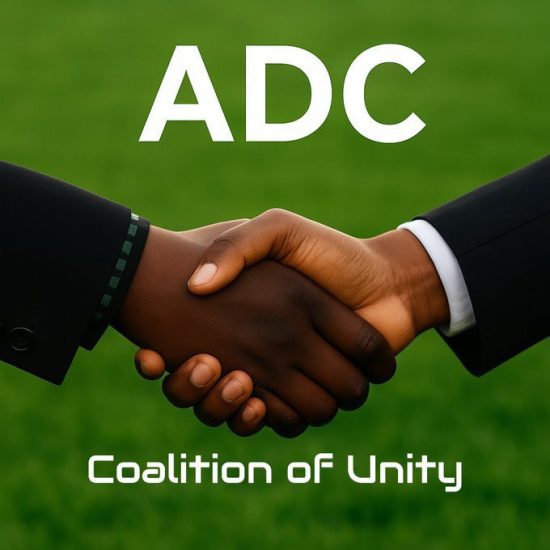In the ever-evolving Nigerian politics, the question of party ownership and leadership remains a contentious and multifaceted issue. The African Democratic Congress (ADC), once a promising vehicle for political reform and representation, has recently become a battleground for competing interests and ambitions. The recent events surrounding the ADC have raised critical questions about the legitimacy of its leadership and the future direction of the party.
The ADC’s current turmoil can be traced back to the resignation of Ralph Nwosu, the party’s former National Chairman, whose departure opened the door for a power vacuum that has since been filled by Nafiu Bala. As the Deputy National Chairman, Bala asserts that the electoral act and the party’s constitution designate him as the rightful successor. His claim is rooted in procedural legitimacy; however, the broader context reveals a party grappling with internal dissent and external pressures.
The Atiku-led coalition, which has garnered significant media attention, has been accused by Bala of attempting to hijack the ADC for their political ambitions. This coalition, comprising figures such as former Vice President Atiku Abubakar, Nasir El-Rufai, Peter Obi, Rotimi Amaechi, Abubakar Malami, and Rauf Aregbesola, has positioned itself as the face of the ADC. Yet, their actions suggest a fractious struggle for dominance rather than a unified vision for the party. The irony lies in the fact that while these leaders advocate for the party’s growth and prominence, they are simultaneously embroiled in a fierce competition for the presidential ticket, which could ultimately undermine the party’s cohesion.
The ADC’s leadership crisis is compounded by the ambitions of prominent figures like Rotimi Amaechi, who has publicly declared his intention to contest the presidency in 2027 under the ADC banner. Amaechi’s resolve of “no retreat, no surrender” highlights the increasingly fragmented nature of the ADC, where individual aspirations may take precedence over collective goals. The stakes are high, and with multiple factions vying for control, the potential for a cohesive party platform diminishes.
Atiku Abubakar’s ambition to secure the ADC’s presidential ticket further complicates matters. His involvement raises questions about the extent to which external influences may shape the party’s identity and direction. The ADC, which was initially conceived as a platform for progressive politics, risks being subsumed by the personal ambitions of its leading figures. As these leaders prepare to engage in a fierce contest for the party’s presidential nomination, the very essence of the ADC may be lost in the fray.
Amidst the chaos, the ADC’s leadership has taken steps to reassert its authority. The party recently cautioned Malam Bolaji Abdullahi against presenting himself as the party’s Publicity Secretary, emphasizing that he lacks both the eligibility and mandate to occupy such a critical position. This move underscores the importance of adhering to established protocols and the necessity of maintaining a clear chain of command within the party. The support for Nafiu Bala from the North-East zonal leadership further solidifies his position, yet it also raises questions about the inclusivity and unity of the ADC’s leadership.
The contrasting claims to leadership within the ADC illuminate the complexities of party ownership. While formal structures and constitutional provisions provide a framework for governance, the legitimacy of leadership ultimately hinges on the trust and support of the party’s constituents. The ongoing power struggle suggests that the ADC’s internal divisions may erode the very foundation of its legitimacy, leading to disillusionment among its members and supporters.
As the ADC grapples with the question of ownership, the implications for its future are profound. The party’s ability to navigate the current crisis will determine its relevance in Nigeria’s political landscape. If the internal factions cannot reconcile their differences and forge a unified vision, the ADC risks becoming a mere footnote in the annals of Nigerian politics.
Moreover, the ongoing power struggle raises broader questions about the nature of political parties in Nigeria. The tendency for individual ambitions to overshadow collective goals is not unique to the ADC; it reflects a systemic issue within the country’s political framework. As parties become increasingly personalized, the potential for genuine representation and democratic engagement diminishes. The ADC’s current predicament serves as a cautionary tale, highlighting the need for a renewed commitment to democratic principles and inclusive governance.
In conclusion, the question of who owns the African Democratic Congress is emblematic of the challenges facing political parties in Nigeria. The interplay of leadership claims, personal ambitions, and the quest for legitimacy reveals a complex situation fraught with tension and uncertainty. As Nafiu Bala assumes the mantle of leadership amidst accusations of hijacking and internal dissent, the ADC stands at a crossroads.
The party’s future hinges on its ability to transcend individual ambitions and forge a cohesive identity that resonates with its constituents. The stakes are high, and the path forward requires a concerted effort to prioritize the collective good over personal aspirations. Ultimately, the quest for ownership within the ADC must be grounded in a commitment to democratic values, inclusivity, and a shared vision for the future of Nigeria. Only then can the ADC reclaim its place as a formidable force in the nation’s political arena.


